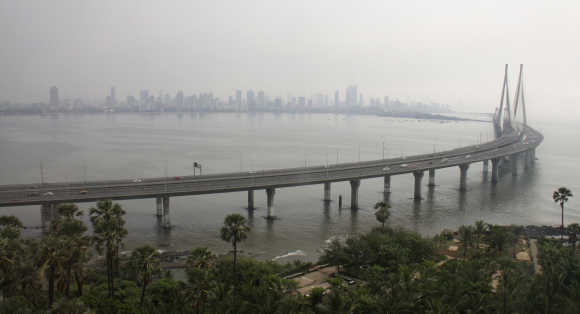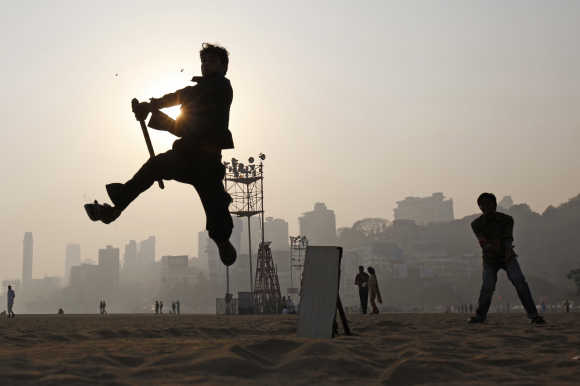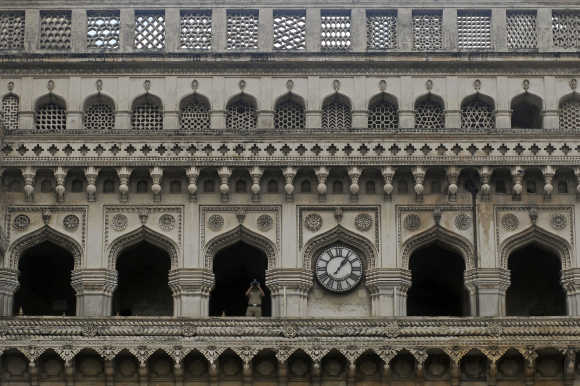Photographs: Courtesy, Nirmalya Kumar
Nirmalya Kumar is a professor of marketing at London Business School, where he is also co-director of the Aditya Birla India Center. His work focuses on marketing and the rise of India as an economic force.
Kumar is the author of several books, including India's Global Powerhouses: How They Are Taking on the World (2009), where he provides an insider's guide to doing business with Indian leaders and companies.
His latest book is India Inside: The Emerging Innovation Challenge to the West.
In an interview with Faisal Kidwai, he discusses the economic challenges facing India, why innovation taking place in the country is going unnoticed in the West and what foreign companies should watch out for before taking on Indian counterparts.
'Political system not allowing economic reforms'
Image: A view of Bandra-Worli sea link bridge, also called the Rajiv Gandhi Sethu, in Mumbai.Photographs: Reuters
Here are the excerpts...
There is lot of talk of companies using social-media tools, such as Facebook, to market their products. How effective are these tools when it comes to marketing?
As of now, companies especially in the consumer marketing sector, are experimenting with social platforms which they see as the next big thing from a marketing perspective.
Clearly, the consumer has gone social with the half a billion Twitter users and now getting close to a billion Facebook users. Yet, it is still unproven marketing territory and no firm will claim to have cracked the social media phenomenon.
Unlike search engines, social media, particularly Facebook, is seen as a private space where users are not really open to advertising while interacting with their friends. Still it is a space to watch as these are early days.
'Political system not allowing economic reforms'
Image: A French tourist walks past Buddhist religious flags at Namgyal Tsemo Gompa monastery in Leh.Photographs: Reuters
Do you think Indians, especially senior managers, are using these tools as much as their Western counterparts?
India is a large market for Facebook as there are more users in India than any other country, with the exception of the United States. Of course, as a proportion of the country's population, Western countries will have a greater participation on Facebook. I suspect the same is true for senior managers by definition.
'Political system not allowing economic reforms'
Image: A man jumps in the air to hit a ball as people play cricket by the beach with an improvised stick for a bat and a piece of wood for wickets in Mumbai.Photographs: Reuters
You have written that lot of innovation is happening in India, but it is not visible to outsiders, especially to consumers in the developed world. Could you elaborate on some of these innovations and why they are not visible to outsiders?
We observed four types of innovations originating from India that remain invisible:
i. Business-to-Business Products for Global Markets: GE's John Welch Centre and Intel's Indian operations in Bangalore have already answered in the affirmative: "Can India be a platform for generating innovation for the global markets?" These companies are seeking to develop B2B products for global markets in their Indian research and development centres just as they do in their R&D centres in the West.
ii. Offshoring of Research and Development Services: Companies like Wipro Technologies deliver IT services to clients abroad and Dr Reddy's Laboratory produce generic drugs for the domestic market. These companies, for example, have slowly convinced major multinationals to outsource parts of their product development and R&D processes.
'Political system not allowing economic reforms'
Image: A fisherman arranges a net as his wife paddles their boat in the waters of the Periyar river on outskirts of Kochi.Photographs: Reuters
iii. Process Innovation: As opposed to product innovation, process innovation is about how a product is made and how new products are developed. Process innovation in India is increasingly surfacing in the outsourcing industry because of a phenomenon we call the "injection of intelligence".
The availability of low-cost, high-skilled labour in India has led to overqualified personnel being assigned to relatively routine jobs. This sometimes results in surprisingly effective process innovations even in what were previously considered "low-tech" settings.
Ultimately, some of these process innovations at companies such as 24/7 and Denuosource are embedded in products in the United States and all over the world.
iv. Management Innovation: Perhaps the most invisible of Indian innovations – the global service delivery model - is responsible for the success of the Indian outsourcing industry. It is not a product or a process innovation, but rather a management innovation, a new way of managing globally distributed work.
It reconceptualises formerly physically collocated activities by breaking them up into subtasks that can be done in different geographical locations, and it specifies the necessary means for integrating this work back again. These four types of substantial innovation taking place in India are "invisible" to end users of developed world.
Take for example, Intel - a company that prides itself on "Inspired Innovation that's Changing the World." While Intel ensures consumers know they're using a personal computer powered by Intel innovation, there isn't any label on the product showing that the innovation originated in India.
'Political system not allowing economic reforms'
Image: A security personnel watches through a pair of binoculars from the historical monument Charminar in Hyderabad.Photographs: Reuters
Many Western companies are entering India in the hope of tapping the huge market. In your view, these companies should keep which factors in mind before taking on their Indian counterparts?
Three things to remember are that India has:
(i) relatively low levels of income which requires companies to often reconceptualise their products and services
(ii) high variability of income requiring firms to think carefully which of the income segments they wish to target and how to have propositions for these widely differing income segments if they decide to go for multiple segments
(iii) unique consumption patterns which requires being aware of the particular nuances of the Indian consumers and marketing to them.
The last has to do with things like high use of television, variety of unorganised distribution networks, and a movie and sports stars dominated culture.
'Political system not allowing economic reforms'
Image: A photographer takes a picture of a monkey in Jammu.Photographs: Reuters
India's growth has slowed down a bit and there seems to nervousness among both national and international investors. What should the government do to calm the markets and boost its image?
What is needed economically is very different from what is possible under the current political climate. India needs a second liberalisation like 1991 as after two decades it is time to free up the many remaining constraints on the economy.
Unfortunately, the political system will not currently allow for even the simplest of reforms like opening up retail, education, and transportation sectors to free markets and foreign direct investment.
As a result, international investors have become pessimistic about the India growth story. However, companies will continue to pursue the growth that will still be there even if it is in the five per cent range rather than the 8-10 per cent per annum range.








article